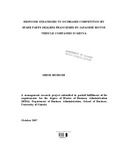| dc.contributor.author | Muhindi, Irene | |
| dc.date.accessioned | 2013-05-10T12:48:22Z | |
| dc.date.available | 2013-05-10T12:48:22Z | |
| dc.date.issued | 2007-10 | |
| dc.identifier.uri | http://erepository.uonbi.ac.ke:8080/xmlui/handle/123456789/21415 | |
| dc.description.abstract | Kenya's motor Sector has undergone major transformations since the advent of Structural
Adjustment Programs (SAP) in the 1990s. The environmental change created pressure to
the firms to adapt their operations to the new conditions. The organizations therefore
have to find new ways of copying with and pre-empting the competitive forces facing
them. The franchised spare parts dealers are increasingly finding themselves competing
with both non-franchised companies and briefcase businessmen who sell a combination
of genuine, generic and second-hand spare parts.
This research project was a study of response strategies to increased competition by
seven spare parts dealers franchised by Japanese motor vehicle companies in Kenya. The
two objectives of the study were to establish the challenges of competition these
companies faced in the context of changing competitive environment and to document
the relevant responses made by the firms.
The study established that the changing competitive situation in the Kenyan spare parts
sector has posed challenges to the franchise holders. These challenges have risen from
changes in the business environment in terms of economic growth that have led to several
new entrants joining the industry. Liberalization of the motor industry, legislative
changes, increasing level of education among the consumers and technological
advancements has also affected how the businesses conduct their activities. The
management of these changes has been made more difficult by the presence of all the five
forces that determine the competitive situation and profitability in the industry.
The research findings indicate that several responses by the franchised spare parts
companies to changes in the environment were done. The firms are continuously
reorganizing the resources and skills to match with the environmental opportunities and
threats faced by the organization. The revision of the strategy at both the strategic and
operational levels has been necessary and has necessitated restructuring of business
processes, marketing, and culture change among other responses. New technology has
also been embraced including up to date computerization of spare parts catalogues and
means of communicating with customers. | en |
| dc.description.sponsorship | University of Nairobi | en |
| dc.language.iso | en | en |
| dc.subject | Spare parts dealers | en |
| dc.subject | Response strategies | en |
| dc.subject | Japanese motor vehicles | en |
| dc.subject | Kenya | en |
| dc.title | Response Strategies to Increased Competition by Spare Parts Dealers Franchised by Japanese Motor Vehicle Companies in Kenya | en |
| dc.type | Thesis | en |
| local.publisher | School of Business, University of Nairobi | en |

